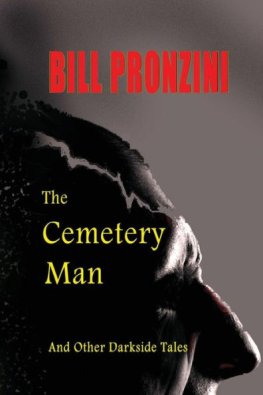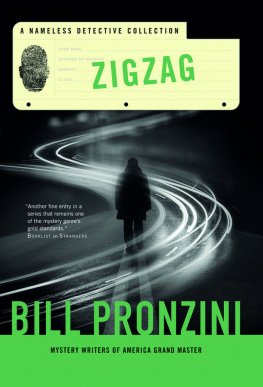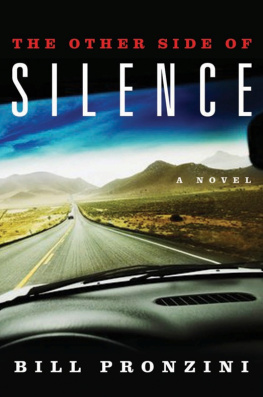Bill Pronzini - Dead Run
Here you can read online Bill Pronzini - Dead Run full text of the book (entire story) in english for free. Download pdf and epub, get meaning, cover and reviews about this ebook. year: 1992, publisher: Carroll & Graf Publishers, genre: Detective and thriller. Description of the work, (preface) as well as reviews are available. Best literature library LitArk.com created for fans of good reading and offers a wide selection of genres:
Romance novel
Science fiction
Adventure
Detective
Science
History
Home and family
Prose
Art
Politics
Computer
Non-fiction
Religion
Business
Children
Humor
Choose a favorite category and find really read worthwhile books. Enjoy immersion in the world of imagination, feel the emotions of the characters or learn something new for yourself, make an fascinating discovery.
- Book:Dead Run
- Author:
- Publisher:Carroll & Graf Publishers
- Genre:
- Year:1992
- Rating:5 / 5
- Favourites:Add to favourites
- Your mark:
- 100
- 1
- 2
- 3
- 4
- 5
Dead Run: summary, description and annotation
We offer to read an annotation, description, summary or preface (depends on what the author of the book "Dead Run" wrote himself). If you haven't found the necessary information about the book — write in the comments, we will try to find it.
Dead Run — read online for free the complete book (whole text) full work
Below is the text of the book, divided by pages. System saving the place of the last page read, allows you to conveniently read the book "Dead Run" online for free, without having to search again every time where you left off. Put a bookmark, and you can go to the page where you finished reading at any time.
Font size:
Interval:
Bookmark:
"STYLISHWRITING, AN EXOTIC LOCALE AND DEFT CHARACTERIZATION ADD UP TO ATREAT."
PublishersWeekly
DeadRun
BILLPRONZINI
Onboard a ship sailing from Singapore to Kuala Lumpur, Dan Connelldiscovers he is being pursued, but can't figure out why. All he knowsfor sure is that the chances are they will find him and when they dohe's as good as dead.
"HEREPRONZINI HAS RETAINED HIS BASIC LOCALE AND CENTRAL CHARACTER USED SOSUCCESSFULLY IN THE JADE FIGURINE....
THEREIS A BANG-UP FINALE....DEAD RUN IS A LOT OF FUN TO READ, IT IS WELLWRITTEN AND IT HAS A RAKISH ADVENTURER WITH WHOM WE ALL CANIDENTIFY."
-TheNew York Times
Thename of the boat on which I booked passage from Singapore was theS.S. Pangkor, and she was one of the last single-stack steamers thatcarried passengers and minor cargoes to and from the smaller porttowns scattered along both coasts of the Malay Peninsula.Transportation facilities in this part of Southeast Asia haveimproved vastly over the past twenty years-on land, on sea, and inthe air-and there are half a dozen faster, more convenient ways totravel or ship merchandise; but the steamers operate on a shoestring,and people without much money or with a frugal or nostalgic natureuse them enough to keep them operating. You get occasionaladventuresome tourists, but for the most part the passenger lists aremade up of poor native laborers, tired drifters and expatriates froma score of different countries, owners and employees of the tinythree- to five-acre rubber plantations known as smallholdings, and amixture of minor businessmen, gamblers, shopkeepers, and whores.
ThePangkor was an ancient craft-the deck boarding creaked every time youtook a step and her white paint had peeled and faded so that she hada tawdry, patchwork-gray look about her -- but the cabins werespacious and clean, if you could afford a cabin, and the food wasusually good and the liquor prices reasonable. In most ways I likedher far more than I could ever like one of the modern tourist boatsthat plied both the Strait of Malacca and the South China Sea. Shemay have been old and frowsy, but she had charm, and she was part ofan exotic old world which was rapidly being swallowed by a lessappealing, sterilized new one.
Herrun was the west coast, from Singapore Island below the southernmosttip of the Peninsula to Langkawi Island at the northernmost tip. Shestopped in places like Batu Pahat and Malacca and Port Dickson andPort Swettenham, among others; but I was only going as far as thelast, some 200 nautical miles from Singapore. Once I got there Iwould disembark and take a bus another twenty-odd statute miles toKuala Lumpur. And in K.L., Martin Quayles would supply a car thatwould bring me to his rubber estate forty additional miles away, inthe lower belly of Selangor's rubber country.
Quayles'sestate was fairly large at 300 acres, and it was called the UnionJack. The British used to control three-quarters of the Malayanrubber industry, primarily through agency houses, but in recent yearsmore and more Chinese have taken over the larger commercialplantations. Men like Quayles, however, who have been dealing inrubber for decades, hang onto their holdings tenaciously. He had acouple of replanted kaboons that had been unproductive for sevenyears and which were now ready to yield again, and he needed a man tosupervise the Malay work force on those acreages. Overseers aren'tthat easy to find these days -- the pay isn't much and you're usuallystuck out in the middle of nowhere -- and he had been having troublelocating someone with experience in rubber.
WhenI heard about this, from the head of a small agency house, I haddecided to contact Quayles. I've lived in Singapore since the middlesixties, and especially in the past three years it has become more ofa home to me than any other place in the world. But decent work isscarce there, and the tourists have begun to overrun the island, andthe 'guiding hand of Prime Minister Lee Kuan Yew has turned to iron.In recent months the Singapore Parliament had passed a number ofradical laws, among them ones providing for hanging or caning andlife imprisonment for those convicted of or complicity in armedrobbery and gun-running; beating and lengthy prison terms fortraffickers in illegal immigrants; jailing or fining and deportationof known criminals. Statutes like these were supposed to protectpublic welfare, and in that respect they were conceivably validenough. But the latter made life potentially harsh for a man with mypast -- and there were other laws and practices which I disliked anddisagreed with, such as a ban on smoking in a variety of publicplaces, the harassment and jailing of kids with long hair and"improper" clothing, the too-righteous railing against"moral and material pollution." I still felt deep personalties with Singapore, and I knew I would want to come back to hersomeday -- but right now I needed and wanted a change.
SoI had telephoned Quayles at his estate and told him frankly thatwhile I had worked rubber before, it had been for only a briefperiod; but, I said, I was certain I could handle the job and wouldeven be willing to accept a lower salary than I had been told he wasoffering. He'd said he would think it over, and a week later Ireceived a letter saying that he had decided to put me on on aconditional basis and instructing me to be in K..L. seven days hence.
Igave up my flat in Punyang Street, in Singapore's Chinatown, andpacked my few belongings into a large rattan suitcase. I had beenworking steadily if not too profitably for an Englishman named HarryRutledge, who owned a waterfront godown, and I had sufficient fundsfor cabin passage on the Pangkor, with more than enough left over tobuy a new bush jacket and jungle boots and some other items I wouldneed in Selangor. I did each of those things the day of departure, ahot, windless Saturday in early October. I also made a courtesy call,before setting out to board the steamer, on Inspector Kok Chin Tiongof the Singapore police; a year ago, when old bitch Fate had draggedme into a complicated and near-fatal mess involving the theft of apriceless jade figurine from the Museum of Oriental Art, Tiong hadfirst hassled me and then, surprisingly, done an unprecedentedabout-face and more or less saved me from official reprisal. Butthere were no friends to say good-bye to, male or female; no ties ofany kind to sever. Being alone in the world -- alone by choice -- hasits advantages at times.
ThePangkor steamed out of Singapore Harbor at 4 p.m. I had found mycabin immediately after boarding, put my suitcase on one of its twobunks, and then had come out on deck again. I stood at the starboardcabin deck rail with several other passengers, taking my last lookfor an indeterminate period at the Lion City's rust-colored tileroofs.
Oneof those other passengers was a tall, fleshy, sable-haired girl inher late twenties -- Filipina, I thought. Her nose was too small, hermouth too wide, and she wore far too much makeup; but high roundbreasts and a fine body and huge black hungry eyes combined to giveher an aura of sensuality that drew and held my attention. I caughther eye and smiled at her, but she wasn't having any. An elderlyplanter type in a crisp tropical suit tried his luck a couple of
minuteslater, and she appraised him and then put on a broad smile; theybegan a conversation which I could not help but overhear. She toldhim in broken English that her name was Maria Velasquez, and that shewas on her way to Kuala Lumpur, and he said his name was Phelps orPhillips and invited her to have a drink with him. They went into theship's saloon, and I stood there and allowed myself a small wrysmile. I looked like what I was and Phelps or Phillips looked likewhat he was: simple as that. Nobody gives anything away in SoutheastAsia these days, and nobody sells anything cheap when they can sellit dear, particularly on a tired old lady like the Pangkor.
Next pageFont size:
Interval:
Bookmark:
Similar books «Dead Run»
Look at similar books to Dead Run. We have selected literature similar in name and meaning in the hope of providing readers with more options to find new, interesting, not yet read works.
Discussion, reviews of the book Dead Run and just readers' own opinions. Leave your comments, write what you think about the work, its meaning or the main characters. Specify what exactly you liked and what you didn't like, and why you think so.

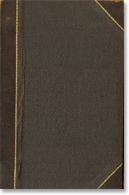
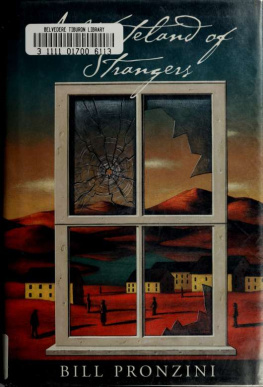
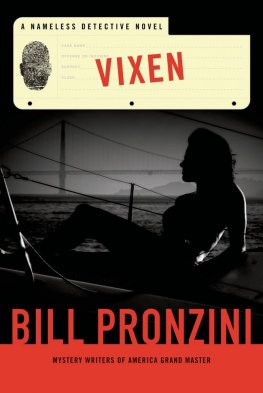

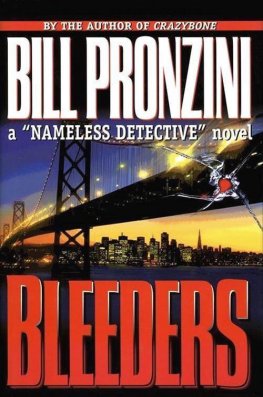
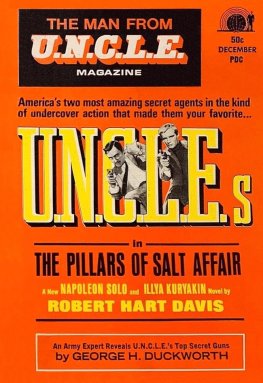
![Bill Pronzini - Sleuths [short story collection]](/uploads/posts/book/922610/thumbs/bill-pronzini-sleuths-short-story-collection.jpg)
